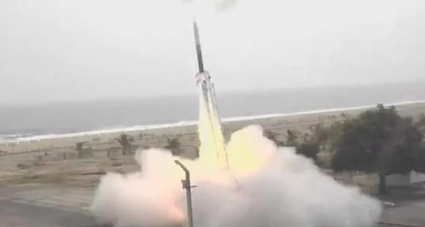India on Friday, November 18 created history when the country’s first private-sector rocket Vikram-S, a suborbital vehicle developed by Skyroot Aerospace, was launched. The launch took place at the Satish Dhawan Space Centre in Sriharikota carrying three CubeSats at 11:30 am under the mission named ‘Prarambh’ (The beginning).
Vikram-S, a single-stage spin-stabilised solid propellant rocket with a mass of approximately 550 kilograms blasted off on Friday to reach a maximum altitude of 81.5 km for mission Prarambh. According to the mission profile, Vikram-S will reach a maximum altitude of 81.5 km in 139 seconds after launch and splash down into the ocean at 290 seconds about 116 km from the launch site.
Notably, Skyroot Aerospace has become the first private company in India to give wings to the Indian space programme, after the Centre opened the sector to private players in 2020.
The Vikram-S rocket is a single-stage suborbital small satellite launch vehicle that stands six meters tall and has a mass of 545 kg, according to Skyroot’s brochure. Having a diameter of 0.4 m, the rocket has a peak vacuum thrust of 7 tonnes and is capable of transporting 83 kg payload to an altitude of 100 km at a peak velocity of Mach 5 (five times the speed of sound). Skyroot says that it is ‘one of the world’s first few all composite space launch vehicles’ and has 3D printed solid thrusters for spin stability. It is powered by the solid-fuelled propulsion system of the Kalam 80 engine and has been developed at a record time of two years, says Skyroot.
As for the ‘Prarambh’ mission, it would test about 80% of the technologies used in Vikram-S and validate for usage on other Vikram series of orbital rockets. One of those rockets, Vikram-1 is scheduled to launch on its first orbital flight in 2023. Launching aboard Vikram-S are three payloads, two of which are from India and one from Armenia. The Indian payloads are CubeSats from SpaceKidz India and N-Space Tech India while the third is the BazoomQ Armenia.


